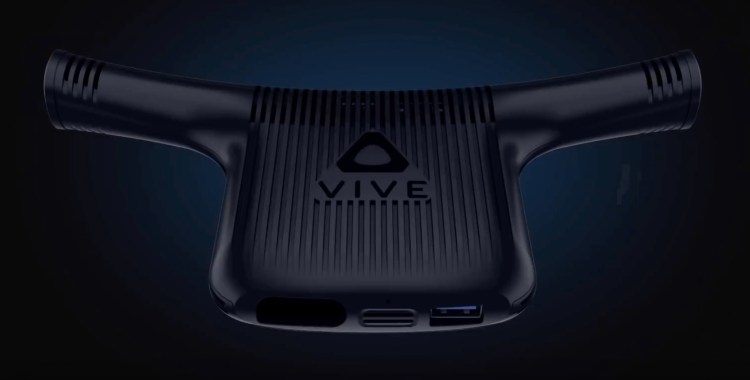HTC’s long-awaited Vive Wireless Adapter is almost ready to buy, the company announced today, as the cutting-edge collaboration between the VR maker and Intel now has a price and preorder and release dates. The accessory will ship on September 24 for $300, including a free two-month Viveport trial subscription. Preorders will start on September 5.
As its name suggests, the Wireless Adapter enables Vive headsets to operate without a cable tethered to a host computer, a once inconceivable technical challenge given the massive amount of bandwidth required for dual high-resolution images at VR-ready high frame rates. It is compatible with the both original Vive and Vive Pro, though the latter headset will also require an additional $60 “compatibility pack.”
Shaped like a T, the Adapter sits on top of the user’s head, with wireless antennas sticking out of the left and right sides, and a cable connecting to a 10,050mAh QuickCharge 3.0 battery in the back. The Adapter promises to work for two to three hours (more recently listed as 2.5 hours), achieving high-bandwidth, low-latency streaming via a budding Wi-Fi standard called WiGig, which transmits data in the “millimeter wave” 60GHz frequency.
Ideal performance is achieved within a less than 20-foot range of the host computer, and up to three Wireless Adapters can be used in the same space — so long as each Adapter has its own computer-connected transmitter. The included transmitter requires the computer to have a free PCIe 1x slot. Notably, HTC has said that the Vive Pro supports 20-foot-square tracking, while the original Vive supports 15-foot-square tracking.
HTC’s $300 asking price places the Vive Wireless Adapter in the same general price range of TPCast’s Business Edition Adapter. which was released in March with up to 5 hours of battery life for Vive use. The TPCast version promises under 2-millisecond latency and 2K resolution support. By comparison, HTC’s specs claim only “near-zero latency” in a lightweight, 4.55-ounce housing.

